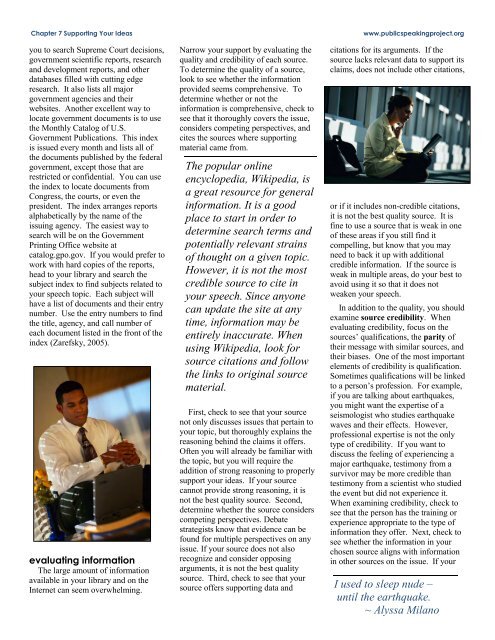supporting your ideas - The Public Speaking Project
supporting your ideas - The Public Speaking Project
supporting your ideas - The Public Speaking Project
Create successful ePaper yourself
Turn your PDF publications into a flip-book with our unique Google optimized e-Paper software.
Chapter 7 Supporting Your Ideas www.publicspeakingproject.org<br />
you to search Supreme Court decisions,<br />
government scientific reports, research<br />
and development reports, and other<br />
databases filled with cutting edge<br />
research. It also lists all major<br />
government agencies and their<br />
websites. Another excellent way to<br />
locate government documents is to use<br />
the Monthly Catalog of U.S.<br />
Government <strong>Public</strong>ations. This index<br />
is issued every month and lists all of<br />
the documents published by the federal<br />
government, except those that are<br />
restricted or confidential. You can use<br />
the index to locate documents from<br />
Congress, the courts, or even the<br />
president. <strong>The</strong> index arranges reports<br />
alphabetically by the name of the<br />
issuing agency. <strong>The</strong> easiest way to<br />
search will be on the Government<br />
Printing Office website at<br />
catalog.gpo.gov. If you would prefer to<br />
work with hard copies of the reports,<br />
head to <strong>your</strong> library and search the<br />
subject index to find subjects related to<br />
<strong>your</strong> speech topic. Each subject will<br />
have a list of documents and their entry<br />
number. Use the entry numbers to find<br />
the title, agency, and call number of<br />
each document listed in the front of the<br />
index (Zarefsky, 2005).<br />
evaluating information<br />
<strong>The</strong> large amount of information<br />
available in <strong>your</strong> library and on the<br />
Internet can seem overwhelming.<br />
Narrow <strong>your</strong> support by evaluating the<br />
quality and credibility of each source.<br />
To determine the quality of a source,<br />
look to see whether the information<br />
provided seems comprehensive. To<br />
determine whether or not the<br />
information is comprehensive, check to<br />
see that it thoroughly covers the issue,<br />
considers competing perspectives, and<br />
cites the sources where <strong>supporting</strong><br />
material came from.<br />
<strong>The</strong> popular online<br />
encyclopedia, Wikipedia, is<br />
a great resource for general<br />
information. It is a good<br />
place to start in order to<br />
determine search terms and<br />
potentially relevant strains<br />
of thought on a given topic.<br />
However, it is not the most<br />
credible source to cite in<br />
<strong>your</strong> speech. Since anyone<br />
can update the site at any<br />
time, information may be<br />
entirely inaccurate. When<br />
using Wikipedia, look for<br />
source citations and follow<br />
the links to original source<br />
material.<br />
First, check to see that <strong>your</strong> source<br />
not only discusses issues that pertain to<br />
<strong>your</strong> topic, but thoroughly explains the<br />
reasoning behind the claims it offers.<br />
Often you will already be familiar with<br />
the topic, but you will require the<br />
addition of strong reasoning to properly<br />
support <strong>your</strong> <strong>ideas</strong>. If <strong>your</strong> source<br />
cannot provide strong reasoning, it is<br />
not the best quality source. Second,<br />
determine whether the source considers<br />
competing perspectives. Debate<br />
strategists know that evidence can be<br />
found for multiple perspectives on any<br />
issue. If <strong>your</strong> source does not also<br />
recognize and consider opposing<br />
arguments, it is not the best quality<br />
source. Third, check to see that <strong>your</strong><br />
source offers <strong>supporting</strong> data and<br />
citations for its arguments. If the<br />
source lacks relevant data to support its<br />
claims, does not include other citations,<br />
or if it includes non-credible citations,<br />
it is not the best quality source. It is<br />
fine to use a source that is weak in one<br />
of these areas if you still find it<br />
compelling, but know that you may<br />
need to back it up with additional<br />
credible information. If the source is<br />
weak in multiple areas, do <strong>your</strong> best to<br />
avoid using it so that it does not<br />
weaken <strong>your</strong> speech.<br />
In addition to the quality, you should<br />
examine source credibility. When<br />
evaluating credibility, focus on the<br />
sources’ qualifications, the parity of<br />
their message with similar sources, and<br />
their biases. One of the most important<br />
elements of credibility is qualification.<br />
Sometimes qualifications will be linked<br />
to a person’s profession. For example,<br />
if you are talking about earthquakes,<br />
you might want the expertise of a<br />
seismologist who studies earthquake<br />
waves and their effects. However,<br />
professional expertise is not the only<br />
type of credibility. If you want to<br />
discuss the feeling of experiencing a<br />
major earthquake, testimony from a<br />
survivor may be more credible than<br />
testimony from a scientist who studied<br />
the event but did not experience it.<br />
When examining credibility, check to<br />
see that the person has the training or<br />
experience appropriate to the type of<br />
information they offer. Next, check to<br />
see whether the information in <strong>your</strong><br />
chosen source aligns with information<br />
in other sources on the issue. If <strong>your</strong><br />
I used to sleep nude –<br />
until the earthquake.<br />
~ Alyssa Milano<br />
7-10


